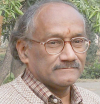a book review by Dr Angelee Deodhar, herself a leading haikuist from India
102 pages, 5.25" x 8.3", Soft-bound. No ISBN. Rs.80 / $8 + postage from the publisher – Prakash Book Depot, Gangwar Complex, Karmchari Nagar Road, Surkha Chaawni, Bareilly (U.P.) 243 003, India or email: prakashbookdepot@sancharnet.in
Book Review by Dr. (Ms.) Angelee Deodhar
Ram Krishna Singh, is one of the most prolific writers amongst the Indian community writing in English. His familiarity with the short poem has been reflected in his earlier books, Above the Earth's Green (1997) and Every Stone Drop Pebble a haiku collection, jointly with Catherine Mair and Patricia Prime, (1999).
In this collection Singh brings together a total of 445 poems in two sections: the first has 140 Tanka (four to a page) and the second has 305 Haiku (five haiku per page).
Whether Singh writes about nature or human nature he shows a keen perception, for example:
Pausing between bites
on the guava tree
the parrots
His first winter
insider a fiber-hut
swirl of snowflakes
In Singh's haiku the reader gets a glimpse of life in India, for example:
In the moving train
sleeping on his feet
the newspaperman
Vultures waiting
for the leftovers
of the sacrifice
Some of the haiku reflect the sensuousness of the poet's personality quite successfully:
Wet bodies
of bathing women:
full moon night
Her body
the night's perfection
in dim light
In a pensive mood, Singh writes:
Unmoved by the wind
he sits on a rock wearing
peace of the lake
A cloud-eagle
curves to the edge
in the west
Amongst the Tanka, two memorable ones are:
Inside me
the whispers of the forest
will be quiet:
no tree will know
what the weather was like
Awaiting the wave
that'll wash away empty hours
and endless longing
in this dead silence at sea
I pull down chunks of sky
It would have been better if the book had been arranged with just two haiku per page with more space around each haiku/tanka. Some haiku seem to have a repetitive theme which could easily have been left out. A few Hindi words for example Apsaras should have been explained with a footnote.
However, Prof. Singh is to be congratulated for his latest collection which well serves his own view, "It is also possible to elevate the quotidian experiences to the level of poetry, using the medium of haiku and tanka, provided one seeks to be visual or sensuous...". His is a voice which deserves to be heard both at home and abroad.
Essay by R.K.Singh
Read 1173 times
Written on 2006-11-24 at 10:55
 Save as a bookmark (requires login)
Save as a bookmark (requires login)
 Write a comment (requires login)
Write a comment (requires login)
 Send as email (requires login)
Send as email (requires login)
 Print text
Print text
THE RIVER RETURNS
The River Returns: A collection of Tanka and Haiku by R.K. Singh102 pages, 5.25" x 8.3", Soft-bound. No ISBN. Rs.80 / $8 + postage from the publisher – Prakash Book Depot, Gangwar Complex, Karmchari Nagar Road, Surkha Chaawni, Bareilly (U.P.) 243 003, India or email: prakashbookdepot@sancharnet.in
Book Review by Dr. (Ms.) Angelee Deodhar
Ram Krishna Singh, is one of the most prolific writers amongst the Indian community writing in English. His familiarity with the short poem has been reflected in his earlier books, Above the Earth's Green (1997) and Every Stone Drop Pebble a haiku collection, jointly with Catherine Mair and Patricia Prime, (1999).
In this collection Singh brings together a total of 445 poems in two sections: the first has 140 Tanka (four to a page) and the second has 305 Haiku (five haiku per page).
Whether Singh writes about nature or human nature he shows a keen perception, for example:
Pausing between bites
on the guava tree
the parrots
His first winter
insider a fiber-hut
swirl of snowflakes
In Singh's haiku the reader gets a glimpse of life in India, for example:
In the moving train
sleeping on his feet
the newspaperman
Vultures waiting
for the leftovers
of the sacrifice
Some of the haiku reflect the sensuousness of the poet's personality quite successfully:
Wet bodies
of bathing women:
full moon night
Her body
the night's perfection
in dim light
In a pensive mood, Singh writes:
Unmoved by the wind
he sits on a rock wearing
peace of the lake
A cloud-eagle
curves to the edge
in the west
Amongst the Tanka, two memorable ones are:
Inside me
the whispers of the forest
will be quiet:
no tree will know
what the weather was like
Awaiting the wave
that'll wash away empty hours
and endless longing
in this dead silence at sea
I pull down chunks of sky
It would have been better if the book had been arranged with just two haiku per page with more space around each haiku/tanka. Some haiku seem to have a repetitive theme which could easily have been left out. A few Hindi words for example Apsaras should have been explained with a footnote.
However, Prof. Singh is to be congratulated for his latest collection which well serves his own view, "It is also possible to elevate the quotidian experiences to the level of poetry, using the medium of haiku and tanka, provided one seeks to be visual or sensuous...". His is a voice which deserves to be heard both at home and abroad.
Essay by R.K.Singh
Read 1173 times
Written on 2006-11-24 at 10:55
| Texts |
 by R.K.Singh Latest textsSHE HIDESMAN PIE-EYED INVERTED IMAGES SEASONAL GRACE |